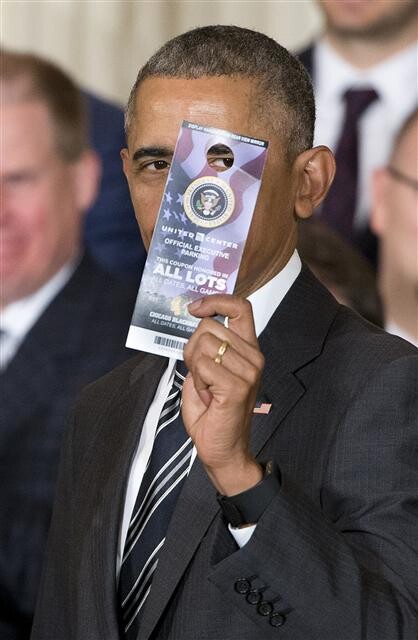hankyoreh
Links to other country sites 다른 나라 사이트 링크
US passes strong additional sanctions on North Korea

US President Barack Obama signed a bill on Feb. 18 imposing strong, comprehensive sanctions on North Korea.
The submission of the signed legislation to Congress meant the law would officially take effect that day. But with the decision on enforcing specific terms left to the executive’s discretion after a period of six months, the question of whether and how sternly they will actually be enforced remains open for the time being.
In a brief statement that day by spokesperson Josh Earnest, the White House introduced three bills, including the North Korea sanctions bill, that Obama had reportedly signed.
The legislation, which was passed by the Senate on Feb. 10 and the House of Representatives on Feb. 12, would allow sanctions not only on individuals or groups involved not only in North Korea’s nuclear and missile development programs but also cyber crimes, human rights infringements, and purchases of luxury goods for leaders.
For the first time, it also allowed sanctions in connection with minerals and metals “for use by or in industrial processes directly related to weapons of mass destruction and delivery systems for such weapons.”
The bill further granted the executive the discretion to impose a secondary boycott in response to violations of United Nations Security Council (UNSC) resolutions and required the Treasury Secretary to report to Congress within six months on whether it had “reasonable grounds” for designating North Korea a “jurisdiction of primary money laundering concern.”
The terms of the bill are a close reflection of the hard-line mood currently prevalent in Washington in response to North Korea’s recent nuclear test and long-range rocket launch.
“If pressure and dialogue have been the two main approaches to North Korea policy to date, there’s an agreement now between South Korea and Washington that we should be focusing more on pressure going ahead,” a senior South Korean official told foreign correspondents in Washington on Feb. 19.
Speaking in a interview with the PBS network on Feb. 17, US Deputy Secretary of State Tony Blinken stressed that North Korea needed to show a sincere commitment to denuclearization before any other steps could be taken.
“[W]e´re not going to play the same game,” Blinken declared.
For now, the crucial moment appears likely to come over the next six months, when the administration is to report to Congress with its decision on whether to adopt ultra-hard-line measures such as imposing a secondary boycott on businesses and banks - mainly Chinese - or designating North Korea a money laundering concern. The biggest obstacle is the fact that those Chinese businesses and banks also do business with counterparts in the US, the Philippines, and Vietnam in addition to North Korea. Also, Beijing appears almost certain to use US businesses as a means of indirectly pressuring Washington into withdrawing the measures it takes. With the sanctions likely to prove self-defeating for the US, making the decision may require a serious incident worth stomaching the increased frictions with China and economic blow.
If the sanctions produced by the UNSC do turn out strong enough to convince the US public, then, the bill could remain a mere formality. Otherwise, Washington may find itself pressured by the public into taking forceful bilateral action. Other variables expected to influence the decision include possible future actions by North Korea to heighten tensions and the level of friction in US-China relations.
By Yi Yong-in, Washington correspondent
Please direct questions or comments to [english@hani.co.kr]

Editorial・opinion
![[Column] Park Geun-hye déjà vu in Yoon Suk-yeol [Column] Park Geun-hye déjà vu in Yoon Suk-yeol](https://flexible.img.hani.co.kr/flexible/normal/500/300/imgdb/original/2024/0424/651713945113788.jpg) [Column] Park Geun-hye déjà vu in Yoon Suk-yeol
[Column] Park Geun-hye déjà vu in Yoon Suk-yeol![[Editorial] New weight of N. Korea’s nuclear threats makes dialogue all the more urgent [Editorial] New weight of N. Korea’s nuclear threats makes dialogue all the more urgent](https://flexible.img.hani.co.kr/flexible/normal/500/300/imgdb/original/2024/0424/7317139454662664.jpg) [Editorial] New weight of N. Korea’s nuclear threats makes dialogue all the more urgent
[Editorial] New weight of N. Korea’s nuclear threats makes dialogue all the more urgent- [Guest essay] The real reason Korea’s new right wants to dub Rhee a founding father
- [Column] ‘Choson’: Is it time we start referring to N. Korea in its own terms?
- [Editorial] Japan’s rewriting of history with Korea has gone too far
- [Column] The president’s questionable capacity for dialogue
- [Column] Are chaebol firms just pizza pies for families to divvy up as they please?
- [Column] Has Korea, too, crossed the Rubicon on China?
- [Correspondent’s column] In Japan’s alliance with US, echoes of its past alliances with UK
- [Editorial] Does Yoon think the Korean public is wrong?
Most viewed articles
- 1[Column] Park Geun-hye déjà vu in Yoon Suk-yeol
- 2Will NewJeans end up collateral damage in internal feud at K-pop juggernaut Hybe?
- 3The dream K-drama boyfriend stealing hearts and screens in Japan
- 4Thursday to mark start of resignations by senior doctors amid standoff with government
- 5Why Korea shouldn’t welcome Japan’s newly beefed up defense cooperation with US
- 6[Guest essay] The real reason Korea’s new right wants to dub Rhee a founding father
- 7N. Korean hackers breached 10 defense contractors in South for months, police say
- 8[Editorial] New weight of N. Korea’s nuclear threats makes dialogue all the more urgent
- 9Up-and-coming Indonesian group StarBe spills what it learned during K-pop training in Seoul
- 10Terry Anderson, AP reporter who informed world of massacre in Gwangju, dies at 76